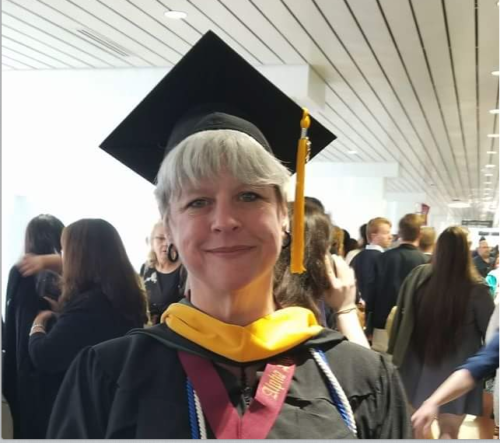BALTIMORE — Shelly “Raven” Mohnkern, an eclectic pantheist, gave the benediction at the graduation ceremony of Loyola University this year. Mohnkern had majored in clinical health counseling and spiritual integration/pastoral counseling, and received a master’s of science degree. In late May, the Wild Hunt spoke with her via email.
At first, Mohnkern had some concerns about marginalization at Loyola. She was not, however, willing to hide herself and her beliefs.
Mohnkern wanted a pluralistic counseling education, and to serve Pagans and Heathens, as well as people with more mainstream religious beliefs. She wanted to learn how to integrate the spirituality of her clients “into their plan for emotional growth and evolution.” When Mohnkern found out that people from many different religious traditions had gone to Loyola, she gained the confidence to go forward.
Loyola is named after the founder of the Jesuit order teaching order, which has a strong reputation for academic excellence. Mohnkern found this reputation attractive.
Mohnkern used every chance to disclose her beliefs. Every class began with each student introducing themselves, describing their progress in the program, and their “faith background.” Mohnkern found no anti-Pagan bias at Loyola; her classmates surprised her with their acceptance and curiosity. Mohnkern said the program encouraged this curiosity and receptivity, as a way to develop empathy and understanding.
Mohnkern began to write the pastoral counseling student blog, “Making Meaning.” This gave her even more opportunities to disclose. She said, “My professors not only encouraged me to represent my faith actively in the classroom, they made certain that I never felt marginalized, or discriminated against, by faculty, staff, or students. That really affirmed to me that I was in the right program, at the right time.” She has recommended the program to other Pagans, and at least two others have since entered and completed the program.
In the fall of 2017, Raven was inducted into the Jesuit honor society, Alpha Sigma Nu. Her Paganism had no bearing on this. Rather than emphasizing religious beliefs, this honor society emphasizes the values of the founder of the Jesuits, Ignatius Loyola.
Mohnkern had to write an essay about her understanding of those values as part of the application process. These values include pursuing excellence, sharing one’s gifts, caring for people in need, and developing the whole person. Jesuit teaching has the mission of encouraging critical thinking and acting responsibly. She approached these universal values from a Pagan perspective. Mohnkern wrote about “the need for seeing clients as whole people, rich in their own beliefs, strengths, and talents.”

Shelly “Raven” Mohnkern [courtesy].
Mohnkern “believed that it would not be truly appropriate to give a benediction that was only phrased to have meaning to one sub-sect of the room. That seems to be almost ironic, as most benedictions are given from an unabashedly Judeo-Christian perspective, but I wanted the blessing I was asking for to be applicable and accessible to all of my fellow graduates.”
When she began to write her benediction, Mohnkern reached out for ideas about how to write it. Some Pagans urged her to be more confrontational in her benediction; they wanted her to emphasize her Paganism as an “act of defiance.” This reflected neither her philosophical outlook nor experience at Loyola. She said, “Loyola was extremely accepting and welcoming, and I am very grateful I took the chance and put myself out there.”
Not everyone can be as open in their Paganism as Mohnkern was at Loyola. She said, “It’s scary and potentially dangerous, however, in this case, it was deeply rewarding for me. If you can do so, take the risk. It can be life-changing.”
The Wild Hunt is not responsible for links to external content.
To join a conversation on this post:
Visit our The Wild Hunt subreddit! Point your favorite browser to https://www.reddit.com/r/The_Wild_Hunt_News/, then click “JOIN”. Make sure to click the bell, too, to be notified of new articles posted to our subreddit.